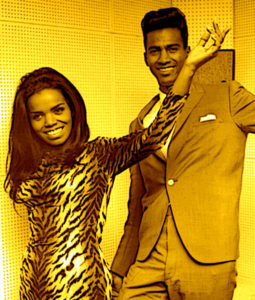There is a strong tradition of male-female duet singing in soul music. Consider teams like Marvin Gaye and Tammi Terrell, Betty Everett and Jerry Butler, Ike and Tina Turner, and Peaches and Herb. Some of these duos were unrelated, while others were either married or involved in a romantic relationship. Inez and Charlie Foxx, however, were a rare example of a sister and brother working together.
They came from Greensboro, North Carolina. Charlie was three years older than his sister. He got his start singing in a gospel choir as a child, and it wasn’t long before Inez joined him. Ambition took her to New York City in 1960, where she was able to secure a record deal with Brunswick Records under the name Inez Johnston. Unfortunately, nothing she did for the label found any success.
Inez and Charlie had worked up an arrangement of a traditional lullaby called “Hush, Little Baby,” and in 1963 they sang it for Juggy Murray, who owned Sue Records. Murray was sold. The song was renamed “Mockingbird” and released on a Sue subsidiary called Symbol Records. The original recording was credited only to Inez, and it rose up the Pop chart to #7, and to #2 on the R&B chart by the end of the year.

“Mockingbird” sold over a million copies and won the duo a Gold Disc from the RIAA. It has been covered many times over the years, including versions by Aretha Franklin, Dusty Springfield, Etta James, Taj Mahal, and the Top 10 cover by Carly Simon and James Taylor in 1973.
Despite the success of what was obviously a duet record, the label was intent on promoting Inez as a solo artist, even though there were clearly two people singing on the records. Songs like “Hurt By Love,” and “1-2-3-4-5-6-7 (Count the Days)” managed to crawl into the Top 100 on the Pop chart, and “No Stranger to Love,” “I Stand Accused,” and “You Are the Man” were Top 50 R&B hits. But “Mockingbird” was considered a novelty hit, and Inez and Charlie Foxx could never fully break out of that box.
In the late ’60s Inez married producer and songwriter Luther Dixon. Together they wrote the Platters hit “I Love You 1000 Times,” and Dixon produced the 1967 Inez and Charlie album Come By Here for Dynamo Records. When the duo failed to repeat their earlier success, Charlie went to work as a songwriter and producer. Inez had a little bit of success on her own, recording for Volt Records in the ’70s after the duo split up.
The music of Inez and Charlie Foxx went on to become a key component of the Northern Soul movement as it developed in the U.K. Charlie died of leukemia in 1998.





Comments